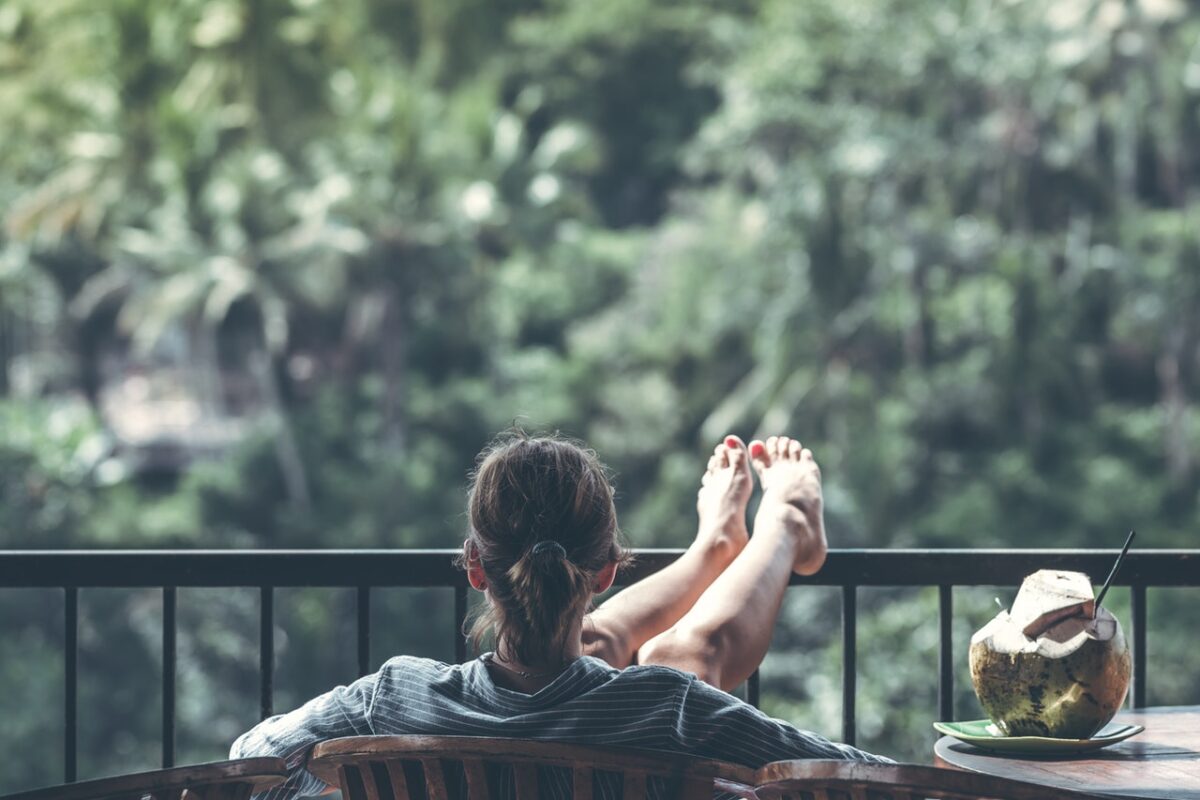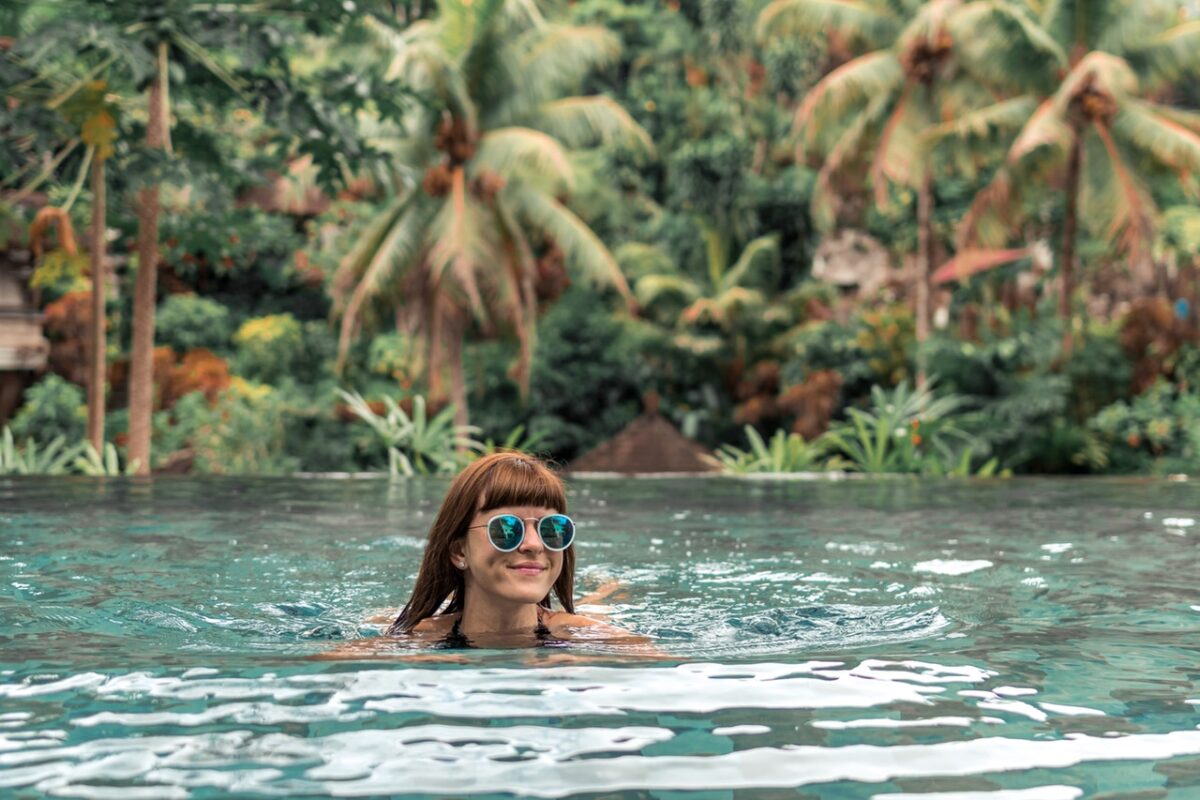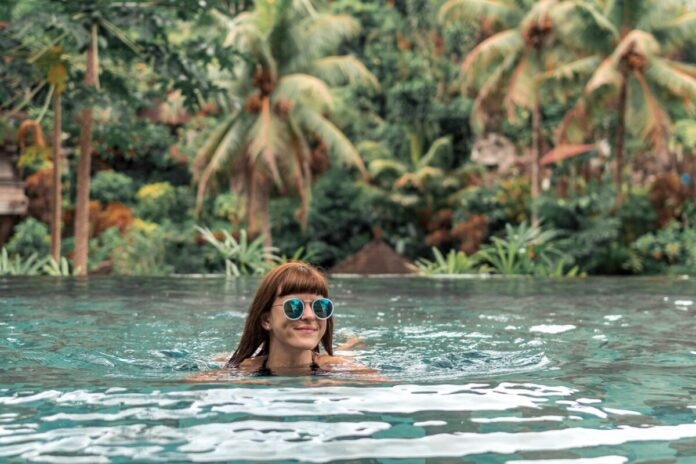Head to the Tropics: Travel Tips for Women
A few years ago I saw a New York Times article about tropical travel essentials. The NY Times is my favorite news source, so I thought the article might be useful, despite my years of experience in the tropics—so I clicked. The first suggestion: get eyelash extensions. You don’t want to be hassled by messy mascara!
I realized that when it came to useful travel tips, I was on my own.
Back in 1993, I was completely unprepared for the tropics. I applied for a job in Malaysia after locating it in the family Encyclopedia Britannica. Come to think of it, I think I applied for the job before I found out where Malaysia was. Either way, I’d never been to the tropics and supposed the few trips to Key West that I had taken had sufficiently prepared me.
I stepped off the plane onto the tarmac in Kuala Lumpur and immediately felt as if I’d been smacked in the face by a wall of steaming dog breath. I was wearing jeans. In more than a dozen subsequent trips to the tropics, I have never again considered bringing jeans. So, Tip #1: no jeans.
I used to relish the discomfort of rough travel and harsh conditions. That was silly – no reason not to be as comfortable as possible. It’s taken a while, maybe 30 years, but now I have a few less obvious tricks up my sleeve. Most pertain to the tropics, but some are universal. Hopefully I’ve made and learned from enough mistakes that I can offer something of value to new travelers—apart from the dire need for eyelash extensions.

photo: Ferry Octavian via flickr
Travel Tip #1: Rash Reduction
You already know that you will go through 1000 band-aids, but grab some nappy cream and medicated powder for heat rash while you’re at the pharmacy. I just Googled ‘cream for diaper rash adults’ and got at least a dozen products returned. Unfortunately, cream on your skin feels a little gross in the tropics if you are doing anything except keeping still. The powder might be my favorite luxury: it feels so good on the skin after a shower. Johnson’s baby “cooling powder” works if medicated powder is not available. No need to bring it with you provided you will be passing a drug store at any point. The same goes for the cream. Tropical residents are on to this.
Travel Tip #2: Hydrate & Stay Cool
It’s all about staying dry and not overheating. I speak from experience. I’ve had heat exhaustion three times. I’m not sure I know how to avoid it (obviously), but don’t be like me, just take my advice: Hydrate. I bring electrolyte powders to make water more appealing and to hopefully help me retain some water whilst it’s pouring out my pores. This is one item I always buy at home and bring with me, as I’ve not found any palatable brands abroad — they all taste like sea water to me. Try a few before you leave so that you have some you like. I find some of our domestic ones repulsive as well.
Staying cool is difficult. If you have a body of water available, soak! I’ll spend 30 minutes in a river just about every day and it keeps me cool for a few hours. Then a quick shower before bed gets me through the night. But it’s that soak that really cools you to the core.
Travel Tip #3: Stay Dry
As for staying dry, it’s not going to happen if you are doing anything physical at all. Still, all of my travel clothing is quick-drying. Even though you’re going to be soaked in a few minutes, you won’t want to put damp clothes on in the morning. Plus, damp clothes will grow mold and get very smelly very fast. You don’t need to spend a fortune on the quick-dry stuff. Check Sierra Trading Post for deals on brands like Ex Officio and Columbia.
Be sure to get the super light-weight clothing. If you are going to a place with land leeches (the main annoyance in Borneo, where I work). And, you might want to avoid convertible trousers and mesh pockets. Almost all field trousers have mesh pockets, and you can’t tell from a photo, so this advice is not very useful if you’re shopping online. Remember, quick-dry socks will serve you better than cotton too.
I never bought a camp towel until a year ago. They felt strange and they were not very absorbent. I tried one this year. They still feel weird and non-absorbent, but their quick-dry quality more than makes up for it. I can shower twice and swim once in a single day and always have a dry towel. No more moldy-smelling towels for me. They’re cheap, buy one!
Travel Tip #4: Get Vaccinated
You probably don’t need to be told you should get some travel vaccinations. You can look up what you need, so all I have to add is to start early. Some require a second jab in six months to be fully protected.
Also, if you regularly take medication that you need to refill and you are leaving for longer than the refill period, stockpile. Refill as early as you can for a few months so you have a supply. I don’t stress too much about having stuff like antibiotics and anti-inflammatories, which are widely available in even rural areas but do try to investigate any medication you’re given that you don’t recognize. I’ve nearly always been just fine, but once my whole crew got terrible conjunctivitis and were given drops that stung like holy hell. I emailed an ophthalmologist friend who told me the medication was A) no longer used in the US and B) useless (which I had already surmised).

Photo: Artem Bali from Pexels
Travel Tip #5: Don’t Self Diagnose. Go to the Doctor
While we’re talking about health, go to a doctor if you get sick! Most tropical nasties don’t resolve without treatment, at least while you are still in the tropics. In particular, broken skin is tough to heal and puts you at risk for all types of unpalatable infections. Don’t self-diagnose! I pride myself in my google self-diagnostic skills, but chances are you’re dealing with some crazy tropical shite.
Travel Tip #6: Get Travel Insurance
Travel insurance is something I never bothered with until recently. I have insurance in my home country, and healthcare is inexpensive in most of the other countries I spend time in. But for about $50, I’ve been getting a three-month plan that covers emergency evacuation to either a hospital in the area or home. Don’t get pulled in by the ads you see. There’s no need for the plans that cost hundreds of dollars unless you have a very expensive and nonrefundable trip planned and you may need to cancel. If you simply don’t want to pay for a helicopter (or ride a mule) to the hospital after losing a limb, emergency evac is probably all you need.
Travel Tip #7: Protect Your Computer
You may have read that computers and tropical humidity don’t mix. I got lucky for years in this respect, spending three months at a time in the tropics with no problems, even though I was never particularly careful. My luck ran out this year when my new laptop got infested with ants. The two primary things to remember to preserve your computer are to:
- turn it off when moving it in and out of air conditioning and don’t turn it back on until it reaches the ambient temperature, and
- zip it tightly away in a sealed case when you’re not using it.
My laptop survived, but the sound is wonky and I suspect some part was either water-damaged or chewed by ants. Also, the battery only charges sporadically, since about mid-way through my last trip.
Travel Tip #8: Protect Against Theft
I haven’t really worried about theft in SE Asia, but I guess it can be a problem in tourist-y places (and in Central and South America). Again, I’ve been lucky, but I’ve heard the horror stories. Beware articles that end with an advertisement for The Ultimate Travel Wallet or whatevs. My approach is to limit my valuables and always have a backup hard drive. With the world-wide proliferation of ATMs, there’s no need to carry cash, and I rarely do. Also, behave as if locked doors mean nothing— because they do. If there’s something you absolutely can’t part with, leave it home or carry it with you at all times.
This year, one of the field stations I work at was robbed. My laptop was in one of the locked labs, but it would have been gone if the thieves were looking for electronics. One researcher had an external hard drive stolen, but it was probably because the case looked like a wallet. Before the theft, I never would have thought to hide my backup drive, but now I do.
Travel Tip #8: Prepare for Rats & Cockroaches
One thing you need to leave at home is squeamishness. You will encounter cockroaches and rats if you are anywhere outside of air-conditioned hotels. If you’re moving around in your travels, I suggest just keeping food out of your room (rats will chew through your luggage to get at even empty food containers) and seal up your toothpaste in bags. If you’re going to be in one place for an extended time, rats may be an ongoing issue, especially if you have a kitchen. My latest and greatest discovery is the electronic rat trap. It electrocutes them: no mess, no wildlife-destroying cats. Bonus: it works on cockroaches too.
Speaking of cockroaches, I’ve found that traps for them actually attract rats. One time I left a bit of my Milo drink in a tall glass, and the next day it had collected and trapped a dozen roaches, but I suspect it’s also what attracted them to the room in the first place. If you are really squeamish about vermin, the best thing I can suggest is that you sleep with a mosquito net tucked into the mattress around you. I learned from experience that a rat will crawl into bed with you and terrorize you at night if you forget to tuck it in. That said, it was a one-time experience and usually rats will try to avoid actually touching you.

Photo: Artem Bali from Pexels
Travel Tip #8: Bring Smart Luxury Items
Again, if you’re going to be living somewhere or on an extended stay, it’s nice to have a few small luxuries. A scented candle is super-handy in smelly rooms with smelly gear hanging around. A jigsaw puzzle in a guest house will guarantee instant new friends, and provide entertainment. Cards Against Humanity is a sure ice-breaker and plays well by candlelight. For planes, trains and automobiles; or waiting in immigration lines; or sleepless nights, make sure you’ve got some downloaded podcasts. Always have a few pairs of earbuds tucked into your various bags.
Travel Tip #9: Set Up Communication Apps in Advance
If you want to keep local phone and text, use WhatsApp for communicating with people at home. Also, consider getting a local sim card. This is a much more economical option than getting an international plan in the US! The only trick is that you need to have an unlocked phone to use it. My provider (Ting – heck, I’ll plug them here, they are fabulous) unlocked my phone with a day’s notice. I bought a sim card once I got to my destination and a month of data with it. I can only speak to Malaysia on price, but I paid US$7 for the card, $15/mo for more internet than I could use (2GB a day, which is endless WhatsApp), and a 1-hour call to the US cost less than $2.
Travel Tip #10: Bring Gifts to Leave Behind
I’ve always struggled with gifts—I hate buying and giving away plastic, or even packaging, so I’ve come up with a few small things I feel good about leaving with hosts, new friends, or a helpful local. Far and away the best thing is photographs of something cool from home: your family, pets, neighborhood, a landmark, public art, your living quarters, office—anything that’s different or personal. Postcards are great for this. I guarantee a nomadic Tibetan has never seen the Statue of Liberty or Mt Rushmore! You can write a message or your email address on the back.
For friends that I see year after year, I buy clothing: cute PJs for their kids, a baseball cap, or a T-shirt with the Space Needle on it. A longer-term host requires something bigger. I go for something useful that is not readily available, usually a kitchen tool. You can buy something locally as well.
One place I stay regularly has a kitchen staff, so I always give one of the staff some money for chicken feet when I leave — something they love but don’t eat often because they eat the same food as the western students they cook for. Unsurprisingly, the students don’t eat chicken feet. I almost always give away my used clothes when I leave a place. Not exactly what I’d call a gift, but I know they will get a whole second life with the recipients.
Kids are tougher. In an effort to avoid plastic and gun/war toy weapons, I usually give a gift of clothing to the parents and a book for the kids I know well. But my favorite thing to do it make soap bubbles. Every household will have some kind of ring lying around. A toilet roll tube works. Just mix some dish soap or laundry soap with water and have the kids hunt for something to blow bubbles with. The hunt is half the game, and a successful bubble feels like a real victory and provides endless entertainment.

Travel Tip #11: Learn the Local Language (A Little)
If I had to choose a single travel tip, it would be this: Learn a few words in the local language. Even a simple greeting will be appreciated. It shows respect and instantly breaks the ice. It doesn’t matter if all you can say is “hello, how are you.” Your new friends will want to try out their English, and you’ve just shown them that you are approachable.
In the end, what you will remember is the bonds you made. Even if fleeting, there’s nothing as fulfilling and heartwarming as reaching across a cultural divide to touch another vastly different human being. You’ll both be immeasurably richer for the experience
READ MORE
DON’T SKIP THAT TRIP: 7 REASONS TO TRAVEL WITH KIDS
8 TIPS FOR TRAVELING WITH ANXIETY
A GIRL’S GUIDE TO SURVIVING THE PARASITES OF SOUTH AMERICA: LA NIGUA





